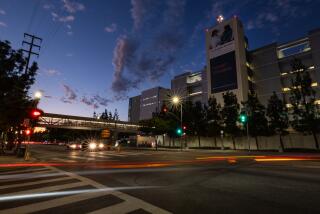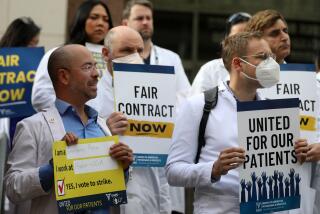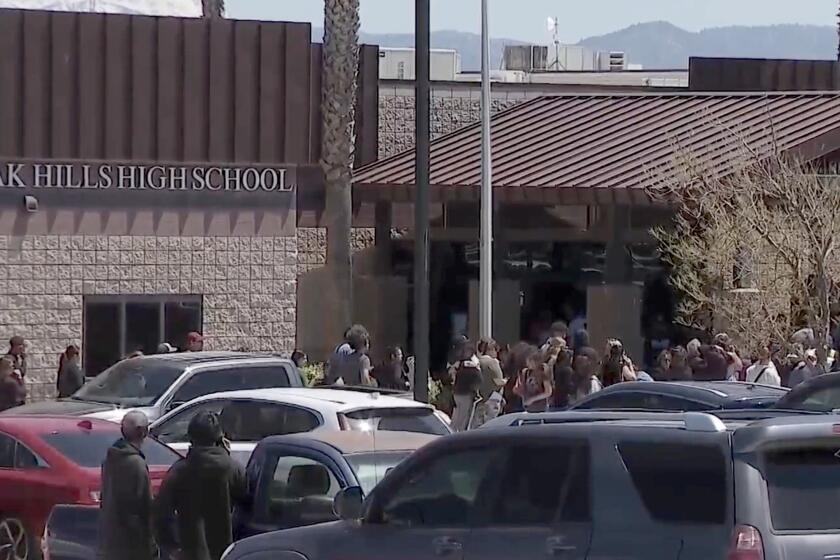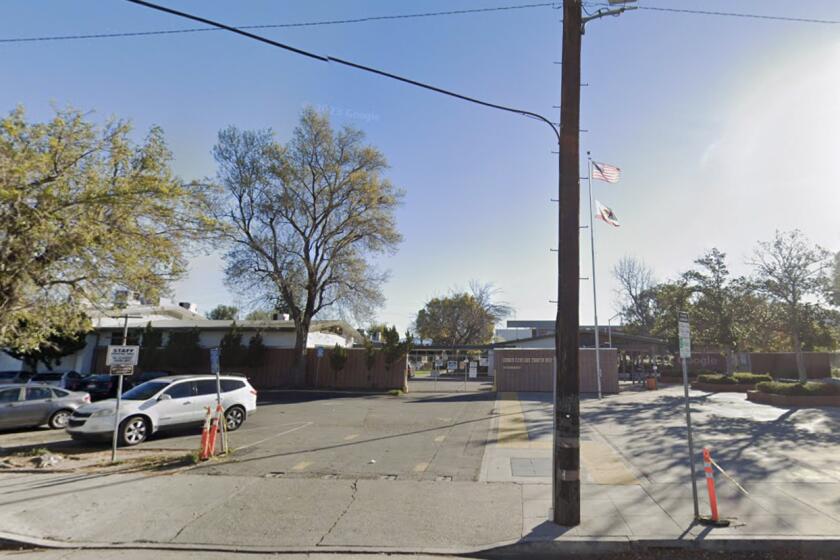Reaction to King/Drew Plan Loud and Clear
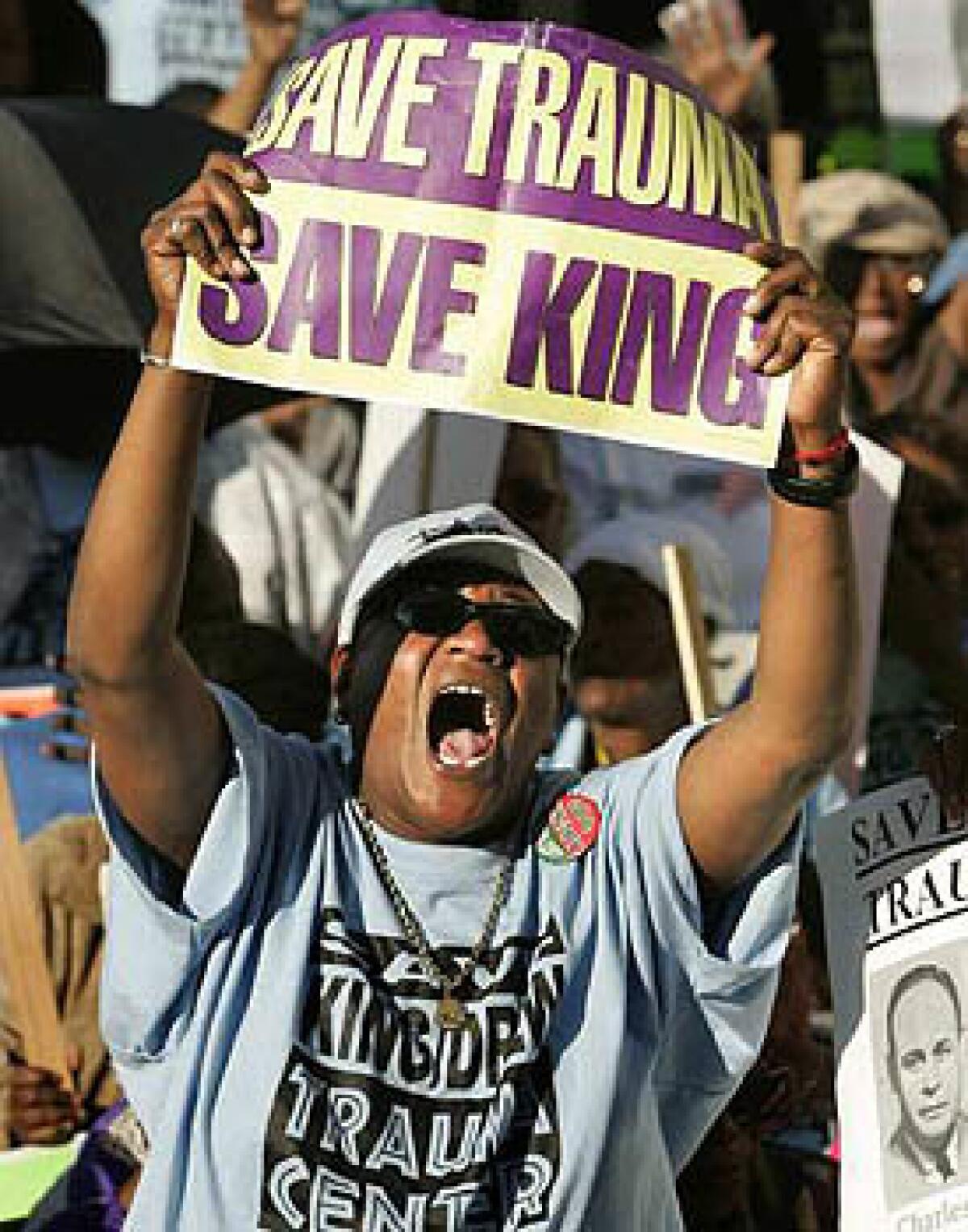
In an outpouring that was by turns hostile and heartsick, the community that relies on Martin Luther King Jr./Drew Medical Center turned out in force Monday to strenuously oppose plans to close the hospital’s prized trauma unit.
A public hearing at an auditorium across from the hospital in Willowbrook, south of Watts, prompted a spirited, daylong protest by well over 1,000 people, who gathered to send a powerful message to the Los Angeles County Board of Supervisors.
The supervisors held the long-promised hearing to fulfill a legal obligation that they gauge community reaction to the proposed closure, which they say is needed to shore up the troubled, county-run hospital.
They got an earful.
Rep. Maxine Waters (D-Los Angeles) led the charge, joined by the Rev. Jesse Jackson, Los Angeles Mayor James K. Hahn and a potent backfield of local, state and national political officials. All of them urged the board to back off from plans that they said would lead to a needless loss of life because critically injured patients would have to travel farther for care.
Jackson brought the crowd to its feet, and left many weeping, with passionate testimony that he delivered in a quiet voice paced by his trademark cadence.
“People here are so emotional because they feel threatened,” he said. “People are scared. There are car wrecks on the freeway — they’re scared. Most of these folks don’t have insurance — they’re scared. They’ve made AK-47s and Uzis legal again — they’re scared.”
“Tell it, tell it!” yelled members of the audience.
Added Jackson: “This hospital was born from that kind of pain.”
King/Drew was built after the 1965 Watts riots to address a healthcare vacuum in South Los Angeles and its surrounding communities.
But the hospital has been plagued by serious lapses in patient care on and off for years, most prominently in the past year, during which neglect contributed to the deaths of at least five patients, and a variety of regulatory agencies have threatened the hospital with sanctions.
It is, however, a hospital that holds deep symbolic significance to African Americans in Los Angeles, and evokes a strong protective sentiment that was on display Monday.
The supervisors have proposed shutting the trauma unit to reduce the burden on the rest of the hospital. The unit treated 2,150 people last year for serious injuries resulting from such incidents as shootings and car accidents.
The county’s health director, Dr. Thomas Garthwaite, has said that the closure was needed because trauma patients put extraordinary demands on a hospital’s staff, and it would be difficult to resolve King/Drew’s problems while offering trauma care.
The proposal would leave open the hospital’s emergency room, which treats more than 47,000 patients a year for problems ranging from flu symptoms to heart attacks.
In response to demands from the federal agency that oversees Medicare and Medicaid, the supervisors have hired an outside consulting firm to take over day-to-day management of the hospital. That decision has elicited little outcry, but the plan to close the trauma center struck a powerful nerve in a community that suffers from more violent crime than any other part of Los Angeles County.
“This is a serious issue that runs very deep, a lot deeper than you know,” Waters told the board at the beginning of the marathon hearing. Noting the large turnout, she added: “I’m begging of you, don’t ignore this. Don’t marginalize this. We want our trauma center kept open!”
At that, the overflow crowd erupted into a sustained, deafening roar that lasted a full minute, coalescing at the end into a chant, “Save King/Drew! Save King/Drew!”
It was one of many chants heard throughout the day.
Fewer than half the people gathered were able to squeeze into the auditorium at King/Drew Magnet High School, which holds 350 people. The rest stood outside, listening to the testimony over two loudspeakers set up on the sidewalk.
They were the remnants of a still larger crowd that had marched earlier in the day and stood outside the high school across the street, waving signs and listening to speakers — including Jackson, Hahn and his political rival, City Councilman Antonio Villaraigosa — denounce the proposed closure.
Many at the rally had been urged to come by their pastors during Sunday services. About 100 clergy members gathered for an ecumenical service Monday morning before marching to the hospital.
The formal hearing began shortly after 3 p.m. and lasted more than six hours, with more than 90 speakers against the closure.
The supervisors, who said they wouldn’t vote on the trauma center closure until at least next Tuesday, didn’t witness the earlier, outdoor demonstration.
However, they appeared flustered by the crowd inside the auditorium, prompting one speaker, the Rev. Frederick O. Murph of Brookins Community AME Church, to say: “Most of you are in shock because you did not anticipate that this community would rally the way it has rallied.”
The supervisors appeared especially rattled by Waters, who seemed at times to have taken control of the hearing away from its chairman, Supervisor Don Knabe. After he suggested a time limit of one or two minutes for speakers, for instance, Waters spoke for more than 20.
The congresswoman, known for her fiery demeanor and populist politics, has battled the board over King/Drew all year, organizing community meetings and threatening to march on the board’s offices.
In her testimony Monday, she excoriated the supervisors and Garthwaite for negotiating a deal with a private, downtown hospital, California Hospital Medical Center, to open a trauma unit that would handle many of the patients who ordinarily would go to King/Drew. She said the contract, which the supervisors are expected to consider today, made the debate over King/Drew’s trauma center moot, because it indicated that the board had made its decision.
Garthwaite drew jeers from the audience when he insisted that the contract with California Hospital would have no bearing on King/Drew’s future.
Waters directed some of her most scathing remarks at Zev Yaroslavsky, the powerful Westside supervisor who has been a leading force in pushing for the trauma closure. She said she heard Yaroslavsky on television recently describing King/Drew as “corrupt.”
“Are you sure you want to describe King that way?” she said, her tone ominous. “Just think about it.”
Yaroslavsky did not respond.
He did suggest later in the hearing that the politics surrounding the hospital should not take precedence over the quality of its care.
“Is anybody here — is anybody here — concerned about the quality of care at this hospital?” he asked.
The crowd yelled back: “Yes!”
Among those at the hearing and rally were actress Angela Bassett; Muhammad Ali’s daughter, Maryum “May May” Ali; and Yolanda King, daughter of the Rev. Martin Luther King Jr., for whom the hospital was named.
Yolanda King said the hospital held “a special place in my heart” and pleaded with the board not to close the trauma center.
Many of those who attended the hearing have been fighting for the hospital since before it was built in 1972.
Assemblyman Mervyn Dymally (D-Compton), who helped arrange state funding for construction of King/Drew, accused the county of “an organized effort to dismantle this hospital.”
Lillian Mobley, a community leader who was one of King/Drew’s founders, got a standing ovation before speaking.
“God hasn’t taken the fight out of me yet,” she said. “Too much has been sacrificed for us to just roll over like firewood and play dead.”
Although the issue at stake is the trauma center, implicit in much of the dialogue Monday was the assumption — strenuously denied by the supervisors and Garthwaite — that the county’s ultimate goal is to close the entire hospital.
Two hours before the hearing began, 47-year-old Paul Shelton was bringing up the rear of a march from the Watts Labor Community Action Committee. Shelton, a painter in a floppy hat, said he was marching to support the hospital and to save the lives of the people who need it.
“How you going to save the hospital by closing it down?” he asked, his voice full of incredulity. “Tell me that!”
*
Times staff writers Steve Hymon and Jim Ricci contributed to this report.
More to Read
Start your day right
Sign up for Essential California for news, features and recommendations from the L.A. Times and beyond in your inbox six days a week.
You may occasionally receive promotional content from the Los Angeles Times.
